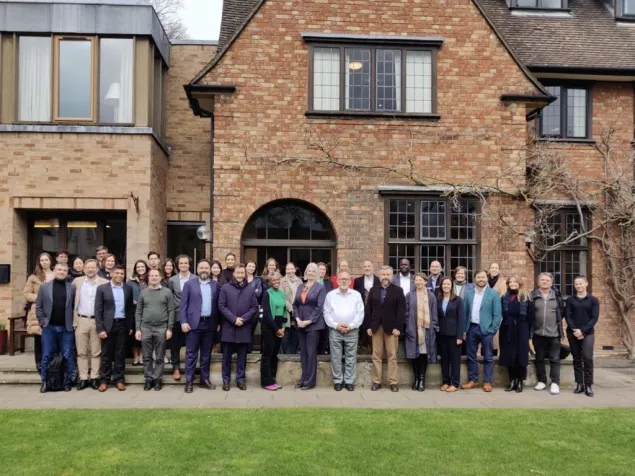10 Years of Data Protection in Humanitarian Action Publication

2025 marks a unique triple anniversary: ten years since the establishment of the International Committee of the Red Cross (ICRC) and the UN High Commissioner for Refugees (UNHCR) data protection regulatory frameworks, as well as the Resolution on Privacy and International Humanitarian Action adopted by the Global Privacy Assembly (GPA) in 2015. On this occasion, the three organizations have come together to produce an edited volume, Data Protection in Humanitarian Action: Responding to Crises in a Data-Driven World (Routledge, 2025), now available online.
Developed jointly by the Data Protection Office of the ICRC, the UNHCR Data Protection Office, and the GPA (the global forum of all data protection authorities and regulators worldwide), the publication takes stock of the lessons learned over the past decade and of the contribution that personal data protection has brought to the humanitarian sector in its ambitions towards responsible digital transformation. It reaffirms how data protection, grounded in the respect for the rights and dignity of affected populations, is a key enabler of effective, accountable, and responsible humanitarian action in the digital age.
Since 2015, the humanitarian landscape has evolved significantly. Digital technologies, ranging from mobile-based registration tools and biometric systems to AI-assisted analysis, have become integral to humanitarian work. These tools have enhanced efficiency and reach, but they have also introduced new complex challenges, including increased third-party dependencies, data sharing, and heightened responsibilities to ensure the respect of individuals’ rights and dignity.
Bringing together leading academic and legal experts, policymakers, and humanitarian practitioners, the book offers a comprehensive exploration of how humanitarian action is adapting to these increasingly complex digital environments. It reflects on the past, but also looks ahead at the opportunities and challenges of emerging technologies, and how the sector can anticipate and prepare for them.

Workshop with editors, Advisory Board members, contributors, and peer reviewers, at Wolfson College, University of Cambridge, 10-12 March 2025
The volume explores these themes across five interconnected sections:
- The first section sets the conceptual and historical framework, tracing how, amid growing complexity of data flows and third-party involvement, data protection has become an operational necessity and enabler for ensuring the respect of the rights and dignity of affected populations. It also maps the different interconnected workstreams of the last 10 years including regulation and supervision, participation in the development of global data protection standards and frameworks, technology research and development, and more.
- The second section examines the digital transformation of the humanitarian space, including how this has been enabled and shaped by increased connectivity, the availability of cutting-edge technologies including biometrics, and the humanitarian-development nexus resulting in a challenging digital ecosystem and infrastructure.
- The third section analyses intersections between data protection, international law, and diplomacy, and reflects on lessons learned from practice, such as those drawn from the 2022 data breach affecting the Red Cross and Red Crescent Family Links Network, and the value of the RFL Code of Conduct on Data Protection.
- The fourth section offers regional and local perspectives, from Ukraine and Kenya to the Asia-Pacific region, illustrating how local legal, cultural, as well as emergency-related realities shape data protection frameworks and their impact in humanitarian contexts.
- The final section looks ahead, exploring how capacity-building fosters trust and how emerging technologies such as artificial intelligence, can be aligned with humanitarian principles.
Intended for practitioners, policymakers, data protection authorities, academics, and experts across the humanitarian and adjacent fields, this book serves as a compass for navigating the complex operational and legal challenges in an increasingly digital and data-driven landscape. By positioning data protection as a foundational element of principled and accountable humanitarian action, it offers timely and forward-looking insights into how the sector can continue to serve humanity and uphold the dignity and rights of people affected by situations of conflict, violence, and other humanitarian emergencies.
Join the Launch Event!
To mark the publication of the volume, the ICRC DPO, together with the UNHCR DPO and the GPA, is hosting a public launch event. All interested participants are warmly invited to attend.
Date: Wednesday, 3 December 2025
Location: Geneva Graduate Institute, Auditorium Ivan Pictet A1B
Maison de la Paix, Chemin Eugène-Rigot 2, 1211 Geneva, Switzerland
Programme
15:00-15:30 – Welcome, Deepfake Exhibition, and Opening Remarks
15:30-17:00 – Panel 1: 10 Years of Data Protection in Humanitarian Action: Presentation and Reflections on the Book
- Charlotte Lindsey Curtet, Independent consultant, Research Fellow with the Berkeley Human Rights Center, and co-CEO of Neutrality Sàrl
- Christina Vasala Kokkinaki, Senior Legal Officer with the Legal Affairs Unit at the International Telecommunication Union (ITU)
- Michèle Dubrocard, Legal Officer at the Policy and Legislative Consultation Unit at the European Data Protection Supervisor (EDPS)
- Serhat Özturk, Legal Officer at Privacy International
- Tatjana Grote, Assistant Lecturer at the University of Essex
Moderated by Aaron Martin, Assistant Professor of Data Science at the University of Virginia
17:00-18:30 – Panel 2: Looking Ahead: Building on Data Protection to Anticipate and Navigate Challenges Ahead
- Max Lamesch, Director for Humanitarian Affairs at the Luxembourg Ministry of Foreign and European Affairs
- Gilles Carbonnier, Vice President of the ICRC
- Ruvendrini Menikdiwela, Assistant High Commissioner for Protection at UNHCR
- Adrian Lobsiger, Swiss Federal Data Protection and Information Commissioner
- Enrica Porcari, Director of IT at CERN
Moderated by Lucie Laplante, Under Secretary General for Legal, Governance and Accountability, ad interim, of the IFRC
18:30-18:45 – Q&A and Concluding Remarks
18:45-19:30 – Drinks and Reception
Resources
- Data Protection in Humanitarian Action - now available on Routledge
- Data Protection in Humanitarian Action by Wojciech Wiewiórowski, European Data Protection Supervisor
- Data Protection in Humanitarian Action: A View from the Americas by Mariana Salazar Albornoz, former Member of the OAS Inter-American Juridical Committee
- Data Protection in Humanitarian Action: Military Personal Data Processing by Tatjana Grote, Assistant Lecturer and PhD candidate at the University of Essex



